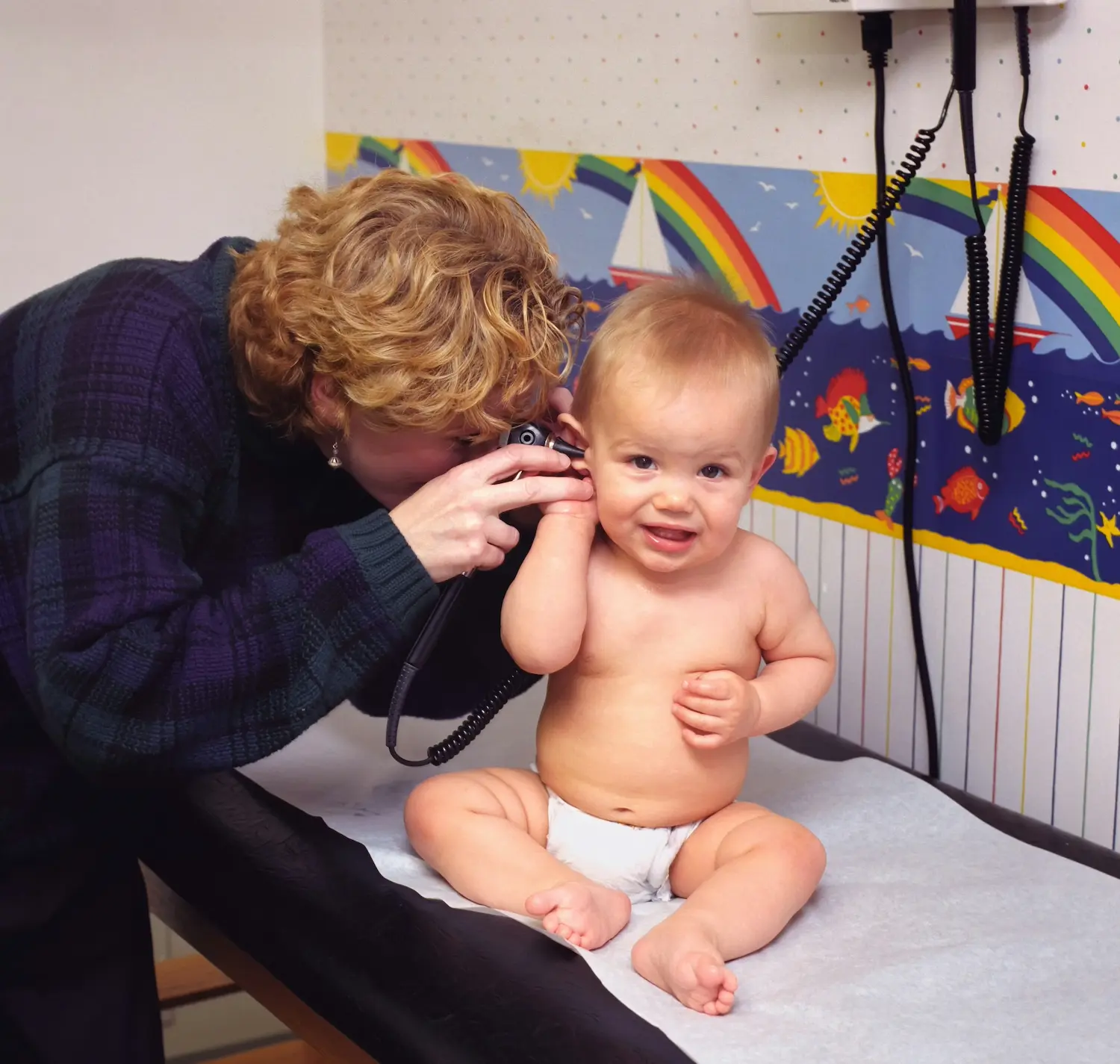Your baby's first year of pediatrician visits, explained
Your baby's first year of pediatrician visits, explained
Lugging your newborn to the doctor’s office can be a chore — especially if they hate their car seat and make it known... loudly. As the parent of a newborn, you’ll be making your way to the pediatrician’s office quite often. Sometimes these visits will be unplanned because your bundle of joy isn’t feeling well. But during a baby’s first year of life, there are at least 7 routine pediatrician appointments, and it can be helpful to know what to expect.
Lugging your newborn to the doctor’s office can be a chore — especially if they hate their car seat and make it known... loudly. As the parent of a newborn, you’ll be making your way to the pediatrician’s office quite often. Sometimes these visits will be unplanned because your bundle of joy isn’t feeling well. But during a baby’s first year of life, there are at least 7 routine pediatrician appointments, and it can be helpful to know what to expect.

Megan N. Freeland, PharmD
Content Writer

Dr. Ali Alhassani
Pediatrics and Sleep Training Expert



Understanding baby checkups
Baby check-ups, often called “well visits” or “well baby visits”, are routine doctor visits with your child’s pediatrician. This is a designated time for the doctor to assess how your baby is doing and for parents to address any concerns they might have.
These early appointments are important because lots of things happen — like immunizations, developmental screenings, and physical exams — that are important for your child’s healthy growth and development.
When to schedule the first pediatrician visit
Technically, your child’s first pediatrician visit will happen in the hospital, birth center, or home, shortly after your baby is born. Your baby should also have their newborn hearing screening done during this time. But your child’s first trip to the ped’s office will happen 3 to 5 days after birth, unless they need to be seen sooner.
As you can imagine, things might be quite hectic then. You’ve just delivered your baby, you may have had a hospital stay, and then you’re discharged and off to the parenting races. It can leave you wondering: when do I actually schedule my baby’s first doctor’s appointment?
Usually, you’ll want to schedule your baby’s first pediatrician visit after they are born, but this means you should already have chosen your child’s pediatrician. You, or a designated support person, can make the call to schedule the appointment shortly after birth.
What happens at the first pediatrician visit
Here’s what typically happens at a newborn’s first doctor appointment.
Completing paperwork. Yes, more paperwork. This is one reason why it can be helpful to bring a support person along, if possible. That way, one person can focus on completing the paperwork while the other can tend to the baby.
Reviewing medical history. It’s important for your child’s doctor to know about your family’s medical history because this lets them know whether there may be any concerns to watch out for when it comes to your baby’s health.
Assessing baby’s growth, sleep, and eating habits. The pediatrician will likely ask you many questions about how your baby has been sleeping and eating, as well as how many wet and poop-y diapers they make per day. This information helps the pediatrician determine how well your baby is growing. They will also weigh your baby on a scale without clothes, and measure their length and the size of their head. They will tell you what percentile your baby is in for each of these measurements, giving you an indication of their size in comparison to other children the same age.
Performing a physical exam. A physical exam for newborns is especially important to see whether the baby might have any injuries from birth. Doctors will check your baby’s head for soft spots, or fontanelles, on top, and talk with you about the soft spots. They will also check your baby’s neck, hips, and umbilical cord, and should give you information on how to keep the area clean until it falls off later. The pediatrician will also check your baby's newborn reflexes and look for signs of jaundice, like yellowing of the eyes or skin.
Preparing for the first pediatrician visit
During this well visit, you'll also get the chance to ask questions. So a great way to prepare for your baby’s first doctor visit is to prepare a list of questions you want to ask in advance. For example:
How can I help my baby regain any birth weight they lose?
How do I care for my baby's umbilical cord, and when will it fall off?
(If you have a baby who was circumcised) How can I help my child's circumcision heal well?
(If you have a baby who was not circumcised) How do I clean my child's penis properly?
How can I help my baby reach their developmental milestones?
Does my baby show any signs of developmental delays?
What should I do if my baby gets sick?
Are there any resources you recommend for postpartum support?
A few practical tips for the first pediatrician visit
Emotionally, the first pediatrician visit can be tough for the family. Your baby may cry because they’re outside their comfort zone, and it can be hard to see your baby upset, even though it's for their own good.
Being prepared with all the supplies and information you need can help make the first well visit easier. Here’s a list of helpful items to bring along:
Extra diapers and wipes
Extra milk, if needed
Extra baby clothes and burp cloths
A blanket (it can be cold in doctor’s offices)
A pacifier if your baby uses one
Your ID and health insurance card
Any helpful notes about complications you may have had during pregnancy or birth
Notes about family medical history
Paperwork you completed from the hospital
Older infant-checkup schedule
After the first pediatrician visit, well baby checkups will probably happen according to this American Academy of Pediatrics (AAP)-recommended infant checkup schedule:
1 month
2 months
4 months
6 months
9 months
12 months
After 12 months, when your baby officially becomes a toddler, checkups will likely happen at 15 months, 18 months, 24 months, and 30 months. From 3 years old onward, child checkups will happen once a year.
What happens at later well-baby visits
Most well baby visits include a standard set of activities, including:
A growth assessment of weight, length or height, and head size
Vaccinations
A physical exam, including checking for jaundice during the first few visits
Evaluating developmental milestones progress
Talking about sleep and nutrition
Questions to ask your pediatrician at well visits
Open communication between parents and their child’s pediatrician is important, since the common goal is to make sure your baby is healthy and growing well. These common questions may help you feel empowered and informed about your baby’s well-being:
What vaccinations are recommended for my child at this age?
Is my child’s growth on track?
Is my child meeting their developmental milestones for this age?
What should my child be eating and/or drinking at this age?
Do you recommend any medications or vitamins for my baby at this age? What are the potential risks and benefits?
What to do between pediatrician appointments
Of course, if there are any other questions, concerns you have, or ideas you want to run by your child’s doctor, well visits are the perfect time to bring them up. But between pediatrician visits, it can be helpful to have a trusted source you can go to for support. Summer Health’s doctors and specialists are available for all your child's primary care and urgent care needs.
There are several ways Summer Health pediatricians and specialists can support you and your family between pediatrician appointments, like:
Answering questions you have about your baby’s sleep, eating habits, growth, development, or behavior
Providing you with breastfeeding tips and recommendations if you run into any issues
Helping you care for your baby if they get sick (You can even send us a photo or video of your baby if there are certain symptoms you’d like us to see or hear.)
With a trusted pediatrician your child can see in-person regularly, and the support of the caring providers at Summer Health, you can ensure your child has the best care team during their first year of life.
Understanding baby checkups
Baby check-ups, often called “well visits” or “well baby visits”, are routine doctor visits with your child’s pediatrician. This is a designated time for the doctor to assess how your baby is doing and for parents to address any concerns they might have.
These early appointments are important because lots of things happen — like immunizations, developmental screenings, and physical exams — that are important for your child’s healthy growth and development.
When to schedule the first pediatrician visit
Technically, your child’s first pediatrician visit will happen in the hospital, birth center, or home, shortly after your baby is born. Your baby should also have their newborn hearing screening done during this time. But your child’s first trip to the ped’s office will happen 3 to 5 days after birth, unless they need to be seen sooner.
As you can imagine, things might be quite hectic then. You’ve just delivered your baby, you may have had a hospital stay, and then you’re discharged and off to the parenting races. It can leave you wondering: when do I actually schedule my baby’s first doctor’s appointment?
Usually, you’ll want to schedule your baby’s first pediatrician visit after they are born, but this means you should already have chosen your child’s pediatrician. You, or a designated support person, can make the call to schedule the appointment shortly after birth.
What happens at the first pediatrician visit
Here’s what typically happens at a newborn’s first doctor appointment.
Completing paperwork. Yes, more paperwork. This is one reason why it can be helpful to bring a support person along, if possible. That way, one person can focus on completing the paperwork while the other can tend to the baby.
Reviewing medical history. It’s important for your child’s doctor to know about your family’s medical history because this lets them know whether there may be any concerns to watch out for when it comes to your baby’s health.
Assessing baby’s growth, sleep, and eating habits. The pediatrician will likely ask you many questions about how your baby has been sleeping and eating, as well as how many wet and poop-y diapers they make per day. This information helps the pediatrician determine how well your baby is growing. They will also weigh your baby on a scale without clothes, and measure their length and the size of their head. They will tell you what percentile your baby is in for each of these measurements, giving you an indication of their size in comparison to other children the same age.
Performing a physical exam. A physical exam for newborns is especially important to see whether the baby might have any injuries from birth. Doctors will check your baby’s head for soft spots, or fontanelles, on top, and talk with you about the soft spots. They will also check your baby’s neck, hips, and umbilical cord, and should give you information on how to keep the area clean until it falls off later. The pediatrician will also check your baby's newborn reflexes and look for signs of jaundice, like yellowing of the eyes or skin.
Preparing for the first pediatrician visit
During this well visit, you'll also get the chance to ask questions. So a great way to prepare for your baby’s first doctor visit is to prepare a list of questions you want to ask in advance. For example:
How can I help my baby regain any birth weight they lose?
How do I care for my baby's umbilical cord, and when will it fall off?
(If you have a baby who was circumcised) How can I help my child's circumcision heal well?
(If you have a baby who was not circumcised) How do I clean my child's penis properly?
How can I help my baby reach their developmental milestones?
Does my baby show any signs of developmental delays?
What should I do if my baby gets sick?
Are there any resources you recommend for postpartum support?
A few practical tips for the first pediatrician visit
Emotionally, the first pediatrician visit can be tough for the family. Your baby may cry because they’re outside their comfort zone, and it can be hard to see your baby upset, even though it's for their own good.
Being prepared with all the supplies and information you need can help make the first well visit easier. Here’s a list of helpful items to bring along:
Extra diapers and wipes
Extra milk, if needed
Extra baby clothes and burp cloths
A blanket (it can be cold in doctor’s offices)
A pacifier if your baby uses one
Your ID and health insurance card
Any helpful notes about complications you may have had during pregnancy or birth
Notes about family medical history
Paperwork you completed from the hospital
Older infant-checkup schedule
After the first pediatrician visit, well baby checkups will probably happen according to this American Academy of Pediatrics (AAP)-recommended infant checkup schedule:
1 month
2 months
4 months
6 months
9 months
12 months
After 12 months, when your baby officially becomes a toddler, checkups will likely happen at 15 months, 18 months, 24 months, and 30 months. From 3 years old onward, child checkups will happen once a year.
What happens at later well-baby visits
Most well baby visits include a standard set of activities, including:
A growth assessment of weight, length or height, and head size
Vaccinations
A physical exam, including checking for jaundice during the first few visits
Evaluating developmental milestones progress
Talking about sleep and nutrition
Questions to ask your pediatrician at well visits
Open communication between parents and their child’s pediatrician is important, since the common goal is to make sure your baby is healthy and growing well. These common questions may help you feel empowered and informed about your baby’s well-being:
What vaccinations are recommended for my child at this age?
Is my child’s growth on track?
Is my child meeting their developmental milestones for this age?
What should my child be eating and/or drinking at this age?
Do you recommend any medications or vitamins for my baby at this age? What are the potential risks and benefits?
What to do between pediatrician appointments
Of course, if there are any other questions, concerns you have, or ideas you want to run by your child’s doctor, well visits are the perfect time to bring them up. But between pediatrician visits, it can be helpful to have a trusted source you can go to for support. Summer Health’s doctors and specialists are available for all your child's primary care and urgent care needs.
There are several ways Summer Health pediatricians and specialists can support you and your family between pediatrician appointments, like:
Answering questions you have about your baby’s sleep, eating habits, growth, development, or behavior
Providing you with breastfeeding tips and recommendations if you run into any issues
Helping you care for your baby if they get sick (You can even send us a photo or video of your baby if there are certain symptoms you’d like us to see or hear.)
With a trusted pediatrician your child can see in-person regularly, and the support of the caring providers at Summer Health, you can ensure your child has the best care team during their first year of life.
References
American Academy of Pediatrics. Recommendations for Preventive Pediatric Health Care. https://downloads.aap.org/AAP/PDF/periodicity_schedule.pdf
American Academy of Pediatrics. Recommendations for Preventive Pediatric Health Care. https://downloads.aap.org/AAP/PDF/periodicity_schedule.pdf
American Academy of Pediatrics. Recommendations for Preventive Pediatric Health Care. https://downloads.aap.org/AAP/PDF/periodicity_schedule.pdf
Summer Health offers fast and reliable pediatric urgent care through online doctors, all via text. Whether you’re worried about your baby's fever, rashes, or other children's health concerns, we provide expert advice and support anytime, right from your phone.

Never miss a post!
Sign up for our newsletter to receive articles and guides directly to your inbox!

















